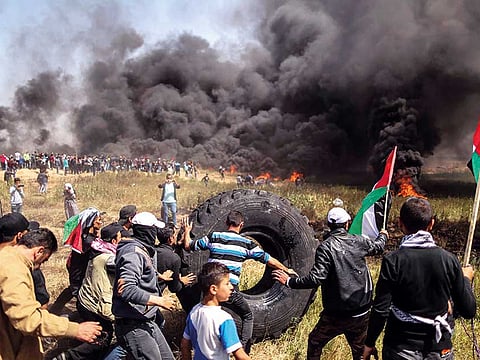Gaza killings draw global indignation
Likening Gaza to a big open-air prison, a newspaper called for an inquiry into the latest violence, and an aid package for the territory

Israeli forces killing several Palestinians and wounding hundreds of unarmed civilians during protests near the Gaza border featured prominently in papers around the world.
Calling the disproportionate use of force on Palestinians a moral and political blow for Israel, the Washington Post noted that the defiance by Netanyahu’s government could prove to be counterproductive for Tel Aviv. The paper editorialised, “Human rights groups have reacted by pouring criticism on the government of Benjamin Netanyahu, while the UN secretary general and several European governments have called for an independent investigation. In sum, Hamas succeeded in dealing Israel a moral and political blow — and the demonstrations are just beginning. Netanyahu’s government remains counterproductively defiant.”
The Guardian carried a trenchant op-ed on how the protests against the Israeli repression by Palestinains often end in tragedy. “Israel believes that it is within its rights to defend its borders in this way. But Gaza is not a separate nation neighbouring Israel. It is a territory under occupation. Even though Israel withdrew its settlers [colonists] in 2005, it continues to maintain effective control of the strip. Palestinians in Gaza marched not towards the border with Israel, but rather towards the fence that has kept them segregated and imprisoned. Diplomats all over the world might shrug away the right of return as a right that cannot be exercised. Yet for the people on the ground, addressing the injustices of 1948 remains at the heart of their quest for freedom, justice and equality. As the funerals that took place in Gaza this weekend attest, protest against Israeli repression often ends in tragedy,” the paper remarked.
Likening Gaza to a big open-air prison, The Hindu called for an inquiry into the latest violence, and an aid package for the territory. “Protests last week along Gaza’s border with Israel, which turned violent were long in the making. Gaza, the 225 sq km strip of land where over two million people live, has been under an Israeli blockade for over a decade. The flow of both goods and people into and out of Gaza is heavily restricted. Life has become miserable under these conditions, and it is not an exaggeration when the territory is called one big open-air prison,” the paper wrote, adding, “Despite international calls and repeated warnings by rights groups, Israel has not eased its restrictions on the strip. It says they are in place for ‘security reasons’. It was against this background, amid mounting frustration and resentment against the status quo, that a six-week sit-in on the Israeli border was organised to protest against the blockade as well as to support the Palestinians’ right to return to the lands that became Israel in 1948.”
The Financial Times roundly criticised Israel for inhumanely squeezing Gaza. In its edit the paper went on to note, “Nowhere near enough is getting into Gaza and even less is able to get out. Eventually, as in any prison where the supply of basic commodities is squeezed inhumanely, the inmates rise up. So it is with Gaza. Its inhabitants appear ready to risk life and limb to have their voices heard.” Pointing to the lack of a credible international mediation and effort to resolve the decades-old conflict that risks slipping into more violence in future, the paper drew a historical context to the recent violence. “Friday’s killings should draw attention to the explosive cocktail that has been brewing as a result. The deaths occurred on the first day of a six-week series of protests culminating at the 70th anniversary commemoration of “Nakba”, when more than 700,000 Palestinian Arabs fled or were expelled from their homes.” Enjoining Israel to exercise restraint, the influential paper culminated its editorial, “Israel, meanwhile, would be wise to exercise restraint. In the absence of credible international mediation, all the ingredients are there for another round of conflict between Israel and the Palestinians. That would be in no one’s interest, least of all Israel’s.”


